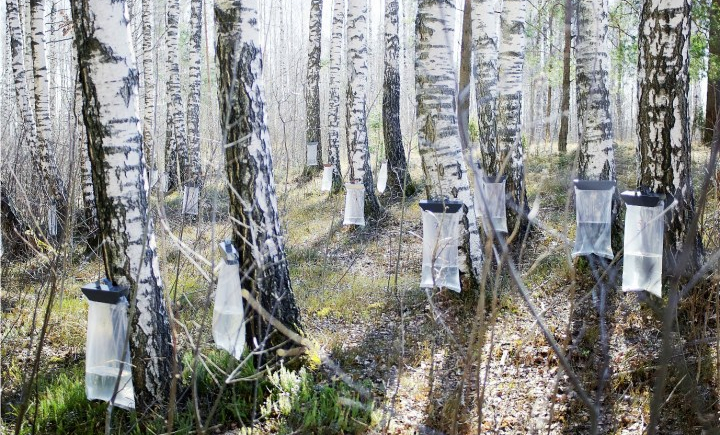by Barbara Chepaitis
April is a month that includes taxes, fools, the occasional snowstorm, and this year the New York Primary. We’ll leave the primary alone. As T.S. Eliot said, April is the cruelest month of all, so we don’t need that added difficulty. It’s also the month that includes Earth Day, and for many, a time to contemplate our relationship to the planet and its nonhuman creatures. Since I’m half Lithuanian, some of those creatures include trees. And so I decided to try a tradition from that country, and tap a birch tree for its sap. Yes. I said birch, not maple.
It’s something done a lot in the Baltic regions and Russia, and even Alaska. The sap or water of the birch has a lower sugar content than Maple, so it’s not as commonly used to make syrup. But it has lots of minerals that are good for you, and from what I’ve read makes a fine wine as well as syrup. However, I didn’t really want any of that. I just wanted to taste a birch tree.

Then again, I’m of Lithuanian heritage, and so I come by it honestly. For Lithuanians, forests were and are sacred places, with some venerable groves being even more sacred than others. I track some of that ancestral spiritual history, that complex relationship with trees and bees, in my novel, The Amber, which also tells the difficulty of a Lithuanian-American woman trying to figure out an affair with a man who sold his soul to the devil.
 In one chapter, I tell my version of a true story about a Bishop who wanted an oak tree cut down because the Lithuanian “pagans” continued to talk to it, give it gifts, and so on. Idolatry, he said, and the tree must go. But nobody would cut it down, not even for him. As I say in the novel:
In one chapter, I tell my version of a true story about a Bishop who wanted an oak tree cut down because the Lithuanian “pagans” continued to talk to it, give it gifts, and so on. Idolatry, he said, and the tree must go. But nobody would cut it down, not even for him. As I say in the novel:“The Bishop served the god of princes, of the wealthy and the learned. Yet, what he wanted was wrong.
How could he kill the tree? Its complex branches and thick trunk were home to so many. Honeybees lived there, in a hive high up, near where lightning had sheared off its back, leaving an open hole. Perkunas came to scorch it, but the bees themselves protected it from his wrath. And birds nested in it, singing morning and night, bringing messages her mother was teaching her to understand. Somehow, the Bishop and his priests didn’t understand any of that, though she wasn’t sure why.”
In ancient Lithuanian practice, trees were home to the honeybees, who taught the best model of community to the people. They were also conduits between this world and the other world, a place the dead can inhabit, a place the living can go to to speak with their dead. A Lithuanian death chant proclaims, “The Linden will be your mother, and the Oak your father. The Birch is your brother and the spruce your sister.”
That respect continued well after Catholicism became the norm. In the 16th century, Lithuanian nuns wrote a prayer exhorting people: “When someone dies, plant a tree. When someone is born, plant a tree. If you build a house, plant a tree. Your prayers will be heard by giving thanks to the trees.”
Of course, beyond any divine attributes you might give to trees, it’s a scientific fact that we’re all in constant relationship with them, on a fundamental level. As my character Stacey notes in The Amber, “We breathe in what they breathe out, and they breathe in our breath.”
That’s just how it is. And so, as a way of honoring my relationship with the trees, I wanted to get a little closer, and taste them. I put the tap in with care, and will close it when I’m done. I won’t tap that particular tree again. When I found my jug full of birch water, I thanked it. I took the water home, and though I know you’re supposed to boil it briefly to avoid bacteria, I took a chance on a few sips fresh from the source.
Though it’s mostly water, it’s also mildly sweet, complex with something you won’t taste in plain water. I asked myself what it tasted like. I answered myself: It tastes like light. Now, you may see this as quirky imaginings of a fiction writer, but I’m not making that up. What I thought of was drinking light.
That thought created a more complex relationship between me and the trees I walk under every day. Though intellectually I’m always aware of what they do to keep me alive, tasting birch water made the connection physical and immediate. Before, I knew. Now, I taste and understand. We share breath. We share water. We share light.
This April, after your taxes are done and the circus has left town, take some time to connect your knowledge with your understanding. Talk with a tree, and listen to it. Plant a tomato, and taste the earth it grows in. Admire a dandelion or a daffodil. Watch a bird wing across the sky. And know that with all this and more, you share breath. You share water. You share light.
Barbara Chepaitis is the author of seven published novels in both sci-fi and mainstream. You can buy her book The Amber here
This article originally appeared on A Literary Lunch
Header image – Sula Biological Farm, Latvia
Like what Deep Baltic does? Please consider making a monthly donation – help support our writers and in-depth coverage of Estonia, Latvia and Lithuania. Find out more at our Patreon page.

